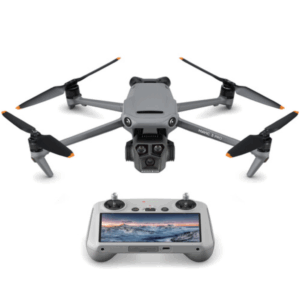Chris Starrett, a retired Iowa State Patrol sergeant, vividly recalls investigating the disappearance of 10-year-old Xavier Harrelson after the boy vanished from his Montezuma, Iowa, home. Locals searched through miles of town, wooded areas and farms.
Starrett launched a drone equipped with thermal imaging from Diamond Lake Park and flew a two-mile radius, unsuccessfully searching for the boy for three days. Four months later, a farmer found Harrelson’s remains in a ditch three miles from his home. Iowa’s Division of Criminal Investigation and the Poweshiek County Sheriff’s Office continue to investigate the case.
Drones don’t guarantee that crimes are solved. Thermal imaging is only effective within a 12- to 18-hour window after a person’s death. However, they provide law enforcement with a critical tool to protect public safety, Starrett said.
“You never know when you’re going to need it,” he said.
Starrett owns SV Aerial Consulting, which provides accident reconstruction, drone mapping, photography, operator training and enterprise sales. He served in the Iowa State Patrol for 18 years, leading the accident reconstruction unit, and retired last year. Starrett is an FAA Part 107-certified commercial drone pilot as well as a certified flight and ground instructor for drones and single-engine aircraft.
In 2019, Starrett and a colleague traveled to Missouri to research that state’s drone program. The Iowa State Patrol bought nine Da-Jiang Innovations drones and started a full-time accident reconstruction program led by Starrett.
The state patrol uses photogrammetry — a method of combining photos with GPS coordinates to create 3D models — to reconstruct accidents. Starrett demonstrated the program’s effectiveness almost immediately.
On Dec. 9, 2019, Starrett was the only law enforcement officer with a drone at the site of a 50-car pileup on Interstate 80 near Altoona, Iowa. He arrived, launched his drone, took photos of the accident scene and finished measurements for the accident reconstruction in 35 minutes.
“If we would have done it the old-school way, it would have been three — probably four — hours, and we probably would have lost a lot of our evidence because it was snowing at the time and it melted at the same time,” Starrett said. “It was huge.”
The Iowa State Patrol has 30 DJI Mavic 3 drones for photogrammetry. Five years ago, Starrett dealt with skepticism from colleagues, lawmakers and others about security issues with Chinese-made drones.
“I got a lot of questions about it. And I go, ‘OK, what about the Panasonic cameras we have in our squad cars that are Wi-Fi — that are Bluetooth?’” Starrett said, pulling out his iPhone to emphasize the point. “It’s no different than our cellphones. Show me an American-made cellphone. When it comes to any kind of computerized technology, we’re behind.”
Starrett said law enforcement agencies should consider the minimal cost of a drone compared with other equipment. In-car camera systems for officers cost about $8,000. The computer system costs another $8,000. The DJI Mavic 3T, which Starrett recommends, is equipped with thermal imaging and costs about $6,500.
On July 19, 2018, an EF3 tornado ripped through Marshalltown, Iowa, injuring 10 people and causing widespread devastation of infrastructure. Starrett was among the first to respond to the scene.
“That would have been nice to have a drone to launch to show command what we’re really dealing with — what power lines were down, what roads were open, what roads were blocked,” he said. “The software that the (state patrol had), you can launch 100 drones. Let’s say we do have a disaster. They could launch just five drones that will automatically transmit a live feed to a command center. When you don’t have that, you’re being the ball and you’re literally hurt for time.”
Starrett said American-made alternatives are much costlier and have less sophisticated software. For example, an Inspired Flight drone costs about $35,000, he said. Helio, an American-made agricultural-spraying drone, costs $90,000 compared with about $30,000 for similar DJI ag-spraying drones.
Now, instead of debating a bill like last year’s Countering CCP Drones Act, Congress and the executive branch are acting under Section 1709 of the 2025 National Defense Authorization Act, which requires a formal national security review of DJI drones by the Office of the Director of National Intelligence before the end of the year.
Reps. Elise Stefanik, R-N.Y., Rick Crawford, R-Ark., and John Moolenaar, R-Mich., wrote to Tulsi Gabbard, the director of National Intelligence, on June 10, urging her to complete the review promptly. If the review is not completed, DJI will automatically be placed on the Federal Communications Commission’s Covered List — effectively banning new models from entering the U.S. market.
DJI says such a ban would harm first responders and the public, pointing to more than 1,000 people rescued worldwide with the aid of DJI drones since the company began tracking such cases in 2017. One recent example: In upstate New York, two hikers were stranded at night with a dying phone battery. A sheriff’s unit found them using a DJI drone equipped with a thermal camera, guiding rescuers in time.
The review comes amid pressure from domestic drone manufacturers and their lobbyists, who have pushed for restrictions on DJI. The Department of Commerce recently opened a national security investigation into imported drones, a move critics say reflects cronyism more than legitimate security concerns.
DJI, which accounts for about 70% of the global drone market, has repeatedly stated that it is a privately held company, not controlled by the Chinese government, and that its products are built to operate without any internet connection. Users have complete control over whether photos, videos or flight logs are stored or shared, and the company says it welcomes an audit free from political influence.
For Starrett, the stakes are simple. Banning DJI drones would take away the best tool he’s ever had for public safety.
“If there’s one thing that I can say, it’s do your damn homework before you vote on something that could decimate a great tool in law enforcement and agriculture,” he said.

